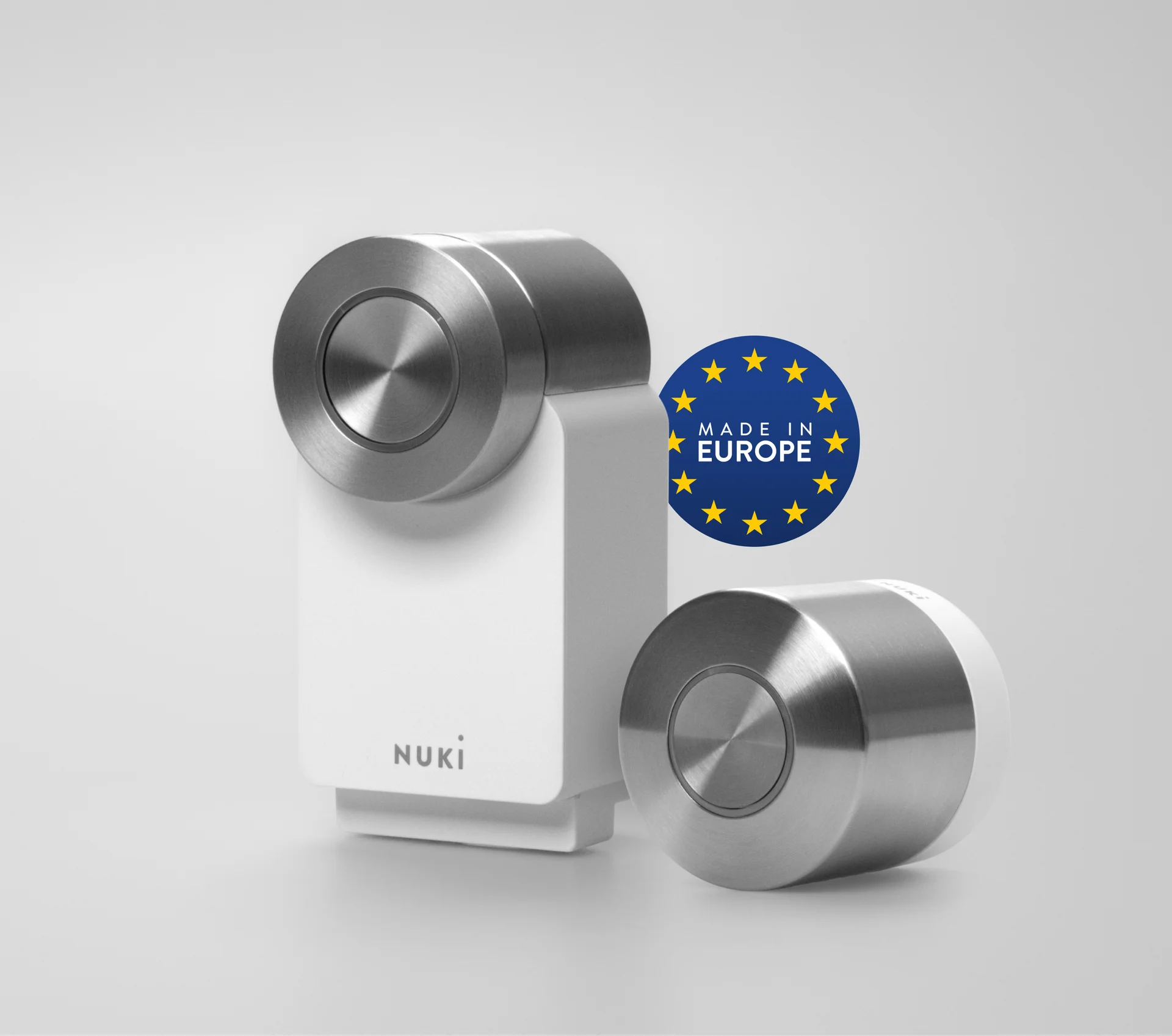Better for users, the environment and the company
Nuki Smart Locks were, are and will remain ‘Made in Europe’
Graz (Austria), on September 25, 2024

- From the very first generation of Smart Locks: Manufacturing in Europe enabled Nuki to achieve a faster market launch in the company’s early days.
- The advantages of geographical proximity are many: from faster resolution of open issues, through accelerated product development to a quicker supply chain.
- Right on track: Relocation of final assembly of all main products to Europe to be completed in two years.
Nuki was founded at the end of 2014 with the vision of making Smart Locks the norm and making everyday life easier for millions of people. Since then, the Austrian company has manufactured its electronic door locks in Europe. The decision not to produce in Asia was made early on and quite deliberately, as co-founder and CEO Martin Pansy notes: "In the early days of Nuki, close ties to our development and production partners were essential. We wanted to ensure short development cycles and thereby achieve a faster market launch while maintaining high quality." Only in this way was it possible for us to implement the idea of a retrofittable, keyless access solution so quickly at the door of customers. Nuki has maintained its European approach to Smart Lock production from the first to the current fourth generation. ‘And we don’t want to do it any differently for future generations,’ emphasizes Martin Pansy.
In addition, the strategic decision in favor of production in Europe is also a decision in favor of sustainability. E-commerce is fast-paced, with rapidly changing demand and customer requirements. To meet market demand, you need a fast supply chain – which is only possible with air freight in the case of goods from Asia. "A European supply chain is the only way for us to be fast and reduce CO2 emissions," says Martin Pansy. Of course, sustainability is also taken into account in our actual production in Europe.
Taking Advantage of In-Person Meetings on Site
Nevertheless, many companies opt for production in Asia due to the lower costs. For Nuki, however, the advantages of European production outweigh the possible cost savings from manufacturing in Asia. Chief Operating Officer Alexander Ketter sees the main advantage in the short distances: "We can reach our suppliers within a few hours and hold face-to-face meetings on site. For a hardware product, this is invaluable." Open issues can be resolved more quickly, and product development is simplified and accelerated. You are more flexible when it comes to shortterm changes in demand. In addition, the shorter distance to production facilities results in shorter transport times and reduced buffer times.
The extent to which users benefit from this can be illustrated by a specific example: The transport time from Asia by sea is around two months. If you take into account the production lead times and the stock levels, it takes four to five months from the time of ordering to the time of receipt of the products. So for every change to a product, you need about half a year for production in Asia. In Europe, transport by lorry takes two to three days. If you factor in the production lead times, it takes two months from the time of ordering to receive the products. Alexander Ketter summarizes: "If we manufacture our Smart Locks in Europe, our users will benefit from product improvements months earlier than if they are manufactured in Asia."
Benefiting from High Quality Standards
According to Alexander Ketter, there are other aspects in which users of Nuki Smart Locks benefit from production in Europe. European industry is heavily influenced by the automotive sector, which attaches great importance to the quality of its suppliers, which has led to quality standards greatly improving in recent decades. "We at Nuki also benefit from this, as many of our current suppliers also supply the automotive industry," notes the Chief Operating Officer. When it comes to quality, Nuki doesn't just rely on others, as co-founder and CEO Martin Pansy emphasizes: "Continuous quality improvement is part of our company DNA – in all areas of the business." This, he says, is also evidenced by Nuki’s double ISO certification, which certifies that the company meets the highest international standards with regard to quality and environmental management systems.
Combining Expertise from Europe and Asia
But with all the advantages of manufacturing Smart Locks in Europe for the environment, users and the company, do Asian producers still have a role to play at all? Nuki is keeping a close eye on the manufacturing industry in Europe, but is also keeping an eye on Asia and its potential for innovation. The aim is to combine expertise from Europe and Asia. "For example, by leveraging the speed and experience of Asian injection molding tool production, but carrying out the manufacturing process fully automatically in Europe," says Alexander Ketter.
Relocating the Final Assembly of All Main Products to Europe
Some Nuki products are still manufactured in China. However, here, too, the decision was made several years ago to relocate production to Europe. The challenges or risks associated with this are seen as manageable. Personnel costs in some Asian countries have risen considerably, making European suppliers more and more competitive. "That’s why we started the process of relocating to Europe at an early stage. In two years, the final assembly of all our main products will take place in Europe." Martin Pansy concludes.
About Nuki Home Solutions
In 2015, the successful crowdfunding campaign on the Kickstarter platform laid the foundation for Nuki’s success story. Since then, the company – founded by brothers Martin Pansy (CEO) and Jürgen Pansy (Chief Innovation Officer) in Graz – has grown steadily: Today, Nuki is Europe’s leading provider of smart, retrofit access solutions. The company currently employs 130 people from 18 different nationalities at its headquarters in Graz. Nuki holds dual ISO certifications – ISO 9001 and ISO 14001 – attesting to its high international standards in quality and environmental management systems. In addition to its Europe-produced Smart Lock and a wide range of accessories and services, the Austrian company is committed to continuously developing smart access solutions for a completely keyless future.
